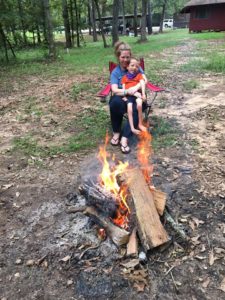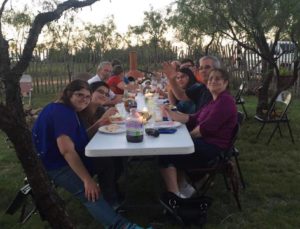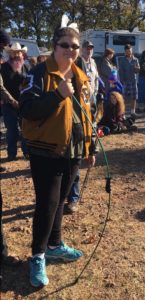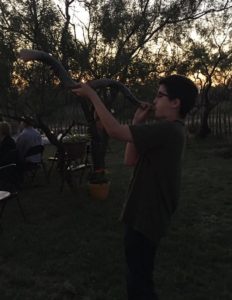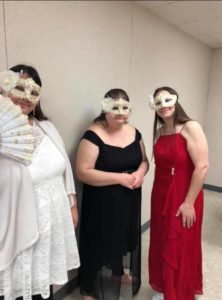Celebrating the Biblical Feasts with a Special Needs Family Member
This blogpost is dedicated to the memory of Evan Hibbets (pictured) who passed unexpectedly in the night on November 3, 2019–two months after the release of this blog. The world is much richer for his life and much poorer without him.
The Feast sections of the Torah, in Exodus, Leviticus, and Deuteronomy, assume the ideal conditions that really did exist at that time: (1) everyone lives close enough to the Tabernacle/Temple to travel there easily, (2) there actually is a Tabernacle/Temple to travel to, (3) wherever the Tabernacle/Temple was located is large and well-stocked enough to accommodate every believer on earth, and (4) people are healthy enough to attend.
In a perfect world, these conditions would still exist, but they don’t. I want to talk about the fourth assumption today and how we can deal sanely and lovingly with the Feasts of the Lord, while treating all of God’s children with equal dignity. As a special needs adoptive mom, equity among believers is incredibly important to me. I have had to face the heartache of telling my special needs son (and his twin) that no, they can’t go to Messianic summer camp–not because I was unwilling to send them, but because my special needs son wasn’t welcome there (I didn’t tell him that, of course, I took the blame myself). I don’t share this out of anger or bitterness–I understand the world of insurance and insuring events–but to show the hidden side of religious life for special needs families and the unknown challenges we face.
Four of the Leviticus 23 Feasts come with minefields for those of us with disabled family members: (1) Passover comes with dietary restrictions, (2) Yom Teruah/Rosh HaShanah calls for the blasting of shofar, (3) Yom Kippur involves fasting food and water for 24 hours, and (4) Sukkot/Feast of Tabernacles involves some aspect of living in a tent for eight days. A “normal” family might have trouble with the fourth Feast listed, in that they may not have the space required to erect any sort of temporary dwelling, but for Special needs families, many of the festival requirements, if looked at as legalistic “must do’s or else,” can be frustrating, confusing, and even devastating to our desire to live Biblically and follow our Savior, walking as He walked.
First of all–we can’t keep the Feasts anymore. We simply practice them. Keeping the Feasts requires a standing, consecrated, central altar on the Temple Mount in Jerusalem. Yom Kippur additionally requires the existence of a “holy of holies” chamber. Passover requires the personal sacrifice of lambs or goats. All of the feasts also require specific national sacrifices. All of the requirements for keeping each Feast were to be performed in the vicinity of the Tabernacle/Temple–this wasn’t optional. In the diaspora (the scattering of believers around the world outside of the Holy Land) we have never been able to keep the Feasts. We can observe the “no work” requirement of the days, have feasts (or fast), study the pertinent Scriptures, observe the spirit of those days, do our best to recreate anything that will not be breaking commandments (which would prohibit building an altar in the backyard and slaughtering our own sacrifices), and we can study out how each of the Feasts relates to the Messiah. There is a lot that we can do, but we must not fool ourselves into thinking that we are actually able to keep any of the Feasts perfectly. We do our best to enter into these times which should be a joy and teach us about the Messiah, not only His first but also His future coming.
Having a special needs family member during these days is a real blessing–unless we are focused on “doing everything right.” We have this wonderful opportunity to serve Yeshua/Jesus in the
flesh by stepping up and serving our family members according to the parable in Matthew 25:34-40
34 “Then the King will say to those on his right, ‘Come, you who are blessed by my Father; take your inheritance, the kingdom prepared for you since the creation of the world. 35 For I was hungry and you gave me something to eat, I was thirsty and you gave me something to drink, I was a stranger and you invited me in, 36 I needed clothes and you clothed me, I was sick and you looked after me, I was in prison and you came to visit me.’
37 “Then the righteous will answer him, ‘Lord, when did we see you hungry and feed you, or thirsty and give you something to drink? 38 When did we see you a stranger and invite you in, or needing clothes and clothe you? 39 When did we see you sick or in prison and go to visit you?’
40 “The King will reply, ‘Truly I tell you, whatever you did for one of the least of these brothers and sisters of mine, you did for me.’
We have this wonderful opportunity to serve others by making the Feasts accessible to those whom the Scriptures call “the least of these”–not because they are actually the least in terms of worth, but because God considers the least of those who are in need of assistance to be of the same worth as His own Son. When we serve someone in need, as Scripture explicitly tells us, we are serving our Master directly. If we go into the Feasts with the idea that it is more important to keep specific commandments legalistically at the expense of our disabled family members, we are also doing that to our King. We cannot honor our King by shaming and marginalizing those around us who need a little or a lot of help. In other words, we can’t see to our own commandment-keeping while pushing someone else off to the side in order to get it done. That’s the antithesis of Kingdom life.
I am going to specifically cover three types of disability, largely because they are the three of which I am most familiar with needing to make allowances: mobility issues and sensory processing spectrum disorders (like autism). I would love to have comments about other sorts of disabilities and what other families do during festivals.
Mobility is only really a problem for the Feast of Sukkot. There are many groups which practically require people to take a week off of work to go camping at some central location. Not only is this not doable for most people in the modern world, who don’t have enough vacation days to cover all the Feasts, but for people with mobility issues it can be a nightmare. Imagine going camping in a wheelchair. Someone might say, “Oh get an RV.” One, most people can’t afford an RV, especially if they have a family member in a wheelchair, and two, they aren’t wheelchair accessible. Three, plenty of people out there would object to someone spending Sukkot in an RV because you just can’t win with some folks no matter how many hoops you jump through. Whenever anyone says that camping is a requirement for Sukkot, they are effectively making transgressors out of people with mobility issues–and for no reason, since the commandment for the Feast requires the Sukkah, the temporary dwelling, to be erected in the vicinity of the Tabernacle/Temple and not your local campground. What we can do, instead, is just try our best to have fun with the commandment. I know of a woman whose husband has ALS–he can’t even get to the gazebo in the backyard so she converted their sun porch. What a great idea! People in cold areas (or super windy, like mine), will often set up something indoors. People with kids will make indoor forts. Some folks might not be able to make it work at all, but remember that we are only practicing, we are not keeping the Feast. No one is, not even the people who live in Jerusalem today. The purpose of Sukkot is to celebrate God’s provision with joy, and I believe that this eight-day festival was given to us to point us to the birth of the Messiah, who I believe was born on the first day and circumcised on the eighth day of Sukkot.
Let’s talk about spectrum disorders, like autism, that can vary in severity. Someone might have a child who is able to do just about anything or just about nothing. Kids with spectrum disorders often need for things to be exactly the same every single day–asking such a child to fast is not only cruel, but asking for trouble. In fact, Rabbinic Law recognizes the importance of sanity in the keeping of the commandments–there is nothing to be gained in forcing an autistic child into a meltdown. Sometimes, that even means that while the rest of the family forgoes leavened bread during the Passover week, the autistic child will go on eating it. I know of a family whose child can only eat soft bread–that’s all they eat. They have an issue with textures, and anything other than the feel of soft bread overloads them and they can’t chew or swallow. Is God to be honored by a starving, screaming, or force-fed child for the entire week? Certainly not. Texture issues are much misunderstood–imagine having a hairy caterpillar in your mouth–that’s how an adverse texture can feel to a severely autistic child. Of course, that’s just one example. I would love to hear some others from all of you. I would also love to add your own family pictures of celebrating.
What about blowing the shofar a hundred times around someone with severe autism or PTSD? Wisdom required, obviously, for this to be a festive day and not a terror-filled one.
And what about if you are attending a formal event with other people? Be sure to get with the coordinators to give them a heads up–people arranging activities will appreciate knowing your special family member’s abilities and interests. Don’t get angry if you get there and find absolutely nothing for your family member to participate in if you didn’t give them a heads up. Event coordinators work very hard but they aren’t mind-readers. We can’t tell them what to do, but we can make it easier for them to come up with activities that will include everyone.
Do what you can, when you can do it. Know when to pull back when something isn’t working. Try again next year. Let’s face it, that is the reality of special needs parenting (or in being a caregiver to an elderly or ailing relative) in everything! The purpose of the Feasts (with the exception of Yom Kippur) is that we share the joy of the reign and Kingdom of our God and King. When we lose sight of that, and boil it down to a list of do’s and don’ts–well, we aren’t so much celebrants as prisoners. Truth is important, but so is Spirit. We must not forget it.
John 4:21-24 Jesus said to her, “Woman, believe Me, the hour is coming when you will neither on this mountain, nor in Jerusalem, worship the Father. You worship what you do not know; we know what we worship, for salvation is of the Jews. But the hour is coming, and now is, when the true worshipers will worship the Father in spirit and truth; for the Father is seeking such to worship Him. God is Spirit, and those who worship Him must worship in spirit and truth.” (NKJV)
I pray that everyone will have a wonderful fall festival season. Here are my “Basics” blogs to this date. I will be writing Yom Kippur Basics within a couple of weeks.
Passover Unleavened Bread Shavuot/Pentecost Yom Teruah/Rosh Hashanah Yom Kippur Sukkot
